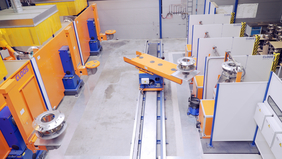
HAIGER/BOXBERG – Increasing volumes, a large number of variants, the shortest possible delivery times and premium quality — at LTI Metalltechnik GmbH, the requirements of its customers are becoming ever more demanding. Since the end of 2015, the company has relied on a linked robot system from Carl Cloos Schweisstechnik GmbH for welding fan wheels. To ensure an efficient production process, the complex system includes an automatic shuttle system for loading and unloading in addition to three ultra-modern welding cells.
LTI Metalltechnik was founded in 1971 and specialises in supplying complex sheet metal components. Over 600 employees work in a total production area of 33,500 square metres at the company's three facilities in Baden-Württemberg, south-west Germany (in Schöntal-Berlichingen, Bobstadt and Boxberg-Windischbuch). In addition, its affiliated companies in the central German state of Thuringia and the UK employ around 150 people between them. The firm's Boxberg-Windischbuch site alone processes 150 tons of metal plate each week. With the motto "We live sheet metal and more" the service spectrum of LTI not only includes every major sheet metal fabrication process, but also design, prototyping and tooling, assembly, powder coating and logistics. "This differentiates us from most contract manufacturers," explains LTI CEO Frank Isaak, who manages the company together with his father, Klaus Isaak.
Traditionally, the family company has maintained a strong presence in the air conditioning and ventilation industry, a sector that still provides 30 per cent of its total business today. However, in recent years LTI has also strengthened its activities in other industries, such as medical technology, the automotive industry, control cabinet technology and also renewable energy. "We don't want to depend exclusively on one industry sector," says Isaak. "With a broad customer base in different areas, we can diversify our risk."
Innovative manufacturing technology for more demanding requirements
"In order to satisfy every customer requirement, we need innovative manufacturing technology, ultra-modern, powerful machinery and efficient logistics," says Isaak. "That's why we've relied on numerous world market leaders from various high-tech industries for many years.” Serving such a wide range of industries places increased demands on the variety of components the company produces, as well as product quality and delivery times. The new CLOOS system was designed to meet customers' specific requirements. The challenge was to produce fan wheels with a range of different diameters in large volumes.
Complex robotic system with three welding stations
The chained CLOOS robot system has four loading and unloading stations in addition to three welding stations. An intelligent shuttle system connects the individual stations with each other. The individual components are each mounted on a jig — in total there are nearly 30 different jig systems and a diverse variety of parts that are processed using different welding programs. The component diameters range between 310 and 560 mm and the sheet thickness between 1.5 and 3 mm. Via a magnetic code on the jig, the shuttle can identify the correct welding station for the component during loading. The welding robot also identifies from the jig which welding program to use for the component.
The three welding cells each have a workpiece positioner with rotating and swivel movement to bring the component into the optimum welding position. The robots weld the components using a MIG/MAG pulsed arc process and the Duo Pulse option. This function extends the energy control possibility. With alternating "hot and cold" pulses the weld pool is modulated by the welding capacity and thus the heat input into the component to be welded can be varied.
Each robot has both an aluminium and a steel welding torch as well as a manual torch change system. Currently, the majority of the components that are welded on the system are made of aluminium. The additional welding torch for steel components further increases the flexibility of the system.
Maximum welding speeds with premium quality
"During development of the system CLOOS was very open and flexible regarding our ideas and suggestions," says Kai Kallsen, welding supervisor for the company's sites in Baden-Württemberg.
He first became aware of the CLOOS shuttle solution at the Schweissen & Schneiden (Welding & Cutting) trade fair in 2013. "Together we have created a system that is the only one of its kind anywhere in the world."
The robots have enabled LTI to double its welding speed in the production of fan wheels. While a manual welder was previously able to weld 40 to 60 cm per minute, the three welding robots each manage 120 cm per minute. There are additional time savings due to the fully automatic workpiece handling. "Without the new robot system we could not handle such high volumes," says Kallsen. "It enables us to process the many component variants without major retooling." One employee can operate three welding cells virtually simultaneously.
Furthermore, the robots ensure maximum process reliability — because they introduce significantly less heat into the component than the manual process, they reduce warping and thus keep rework to a minimum.
An additional benefit of the new system: the jigs' coding system allows seamless documentation, making it possible to track the particular robot, time and welding program used for every single weld.
Carl Cloos Schweisstechnik GmbH
Carl-Cloos-Strasse 1, 35708 Haiger
Stefanie Nüchtern-Baumhoff
Tel. +49 (0)2773 85-478
E-Mail: stefanie.nuechtern@cloos.de